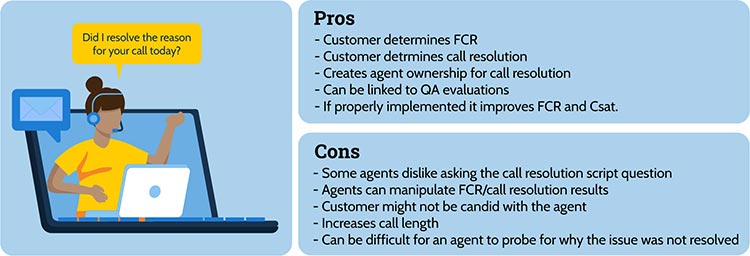Agents Ask Customers a Call Resolution Question
Many SQM clients have their agents ask customers a call resolution question at the end of the call. They have their agents use two different types of call resolution questions. The two common call resolution options are, “Did I resolve the reason for your call today?” or “Did I give you clear next steps to resolve your call?”
They set a target that the agent asks the customer on 90% of their calls, “Did I resolve the reason for your call today?” and for 10% of their calls, the agents ask, “Did I give you clear next steps to resolve the reason for your call?”
Although the call resolution question slightly increases call length, the real benefits of this practice are that it increases agent awareness and accountability for resolving customer calls, reduces repeat calls, and improves First Call Resolution (FCR) and customer satisfaction (Csat).
It is essential to mention that many agents do not like asking the call resolution question. The main reason for this is that if the agent cannot resolve the call, they do not want to ask the call resolution question. SQM has some clients who have discontinued the call resolution question practice because their agents did not like asking this question. When those clients stopped this practice, their FCR performance decreased in most cases.

Agents Ask Customers if They Resolved Issues – Best Practices
Many call center end of call practices have agents ask customers, “Is there anything else I can do for you?” This script is common, but it assumes that the agent has already resolved the customer’s call, which might not be accurate.
It is a best practice to ask the call resolution question at the end of the call to improve FCR performance. In addition, there should be multiple call resolution closing scripts available for agents to use when they either feel the call was resolved or think the call was not resolved. If the agent feels the call is not resolved, the customer should be informed of the options available or the next steps to resolve the customer’s call.
SQM considers the following to be best practices for using a call resolution closing script:
-
Agent summarizes key aspects of the call and next steps
-
The agent uses a call resolution closing script
-
Every customer is consistently asked the call resolution closing question
Note: The goal should be to use the call resolution closing script 90% of the time, and business rules need to be developed as to when not to use the call resolution closing script. The following are not good call resolution questions and should not be used: “Have I answered all your questions/concerns?” “Are you satisfied with the resolution?” or “Is there anything else I can do for you?”
-
Agents use one of the following call resolution closing scripts when they believe they have resolved the call:
-
“Did I resolve the reason for your call today?”
-
“Did I take care of the reason for your call today?”
-
Note: 90% of the time, the agent asks one of these scripts
-
Agents use one of the following call resolution closing scripts when they feel they were not able to resolve the call:
-
“Did I give you clear next steps to resolve your call?”
-
“Did I give you an option(s) to resolve your call today?”
-
Note: 10% of the time, the agent asks one of these scripts
-
Agent captures a ‘yes’ or ‘no’ response in a CRM system; for the ‘no’ response, the agent can use a drop-down menu on the CRM system to tag the reason for the call being unresolved
-
If the customer says ‘no,’ the agent can ask the customer, “Why do you think I have not resolved the reason for your call?”
-
Train agents on how to handle customer’s ‘no’ response to the call resolution closing script question
-
If the agent cannot resolve the customer’s call, the agent can transfer the call to an escalation or helpdesk agent
-
Agents asking a call resolution closing script question is included in the QA form to measure compliance
-
QA team tracks agent call resolution performance to identify trends and opportunities for FCR improvement
5 Pros and Cons of Agents Ask Customers if They Resolved Issues
The pros of the agent asking the customer if they resolved the reason for their call are: that the customer determines FCR/call resolution, it creates agent ownership for call resolution, it can be linked to QA evaluations, and most importantly, if properly implemented it improves FCR and Csat.
Conversely, the cons of the agent asking the customer if they resolved the reason for their call are: some agents dislike asking the call resolution script question, agents can manipulate FCR/call resolution results, the customer might not be candid with the agent, increases call length, and can be difficult for an agent to probe for why the issue was not resolved.

Quick Related Links
First Call Resolution Definition First Call Resolution PPT First Call Resolution Benefits
First Call Resolution Strategies First Call Resolution Operating Philosophy Call Handling Case Study Customer Quality Assurance CRM Average Speed of Answer Concierge Service Handling Customer Complaints VoC Performance Management
